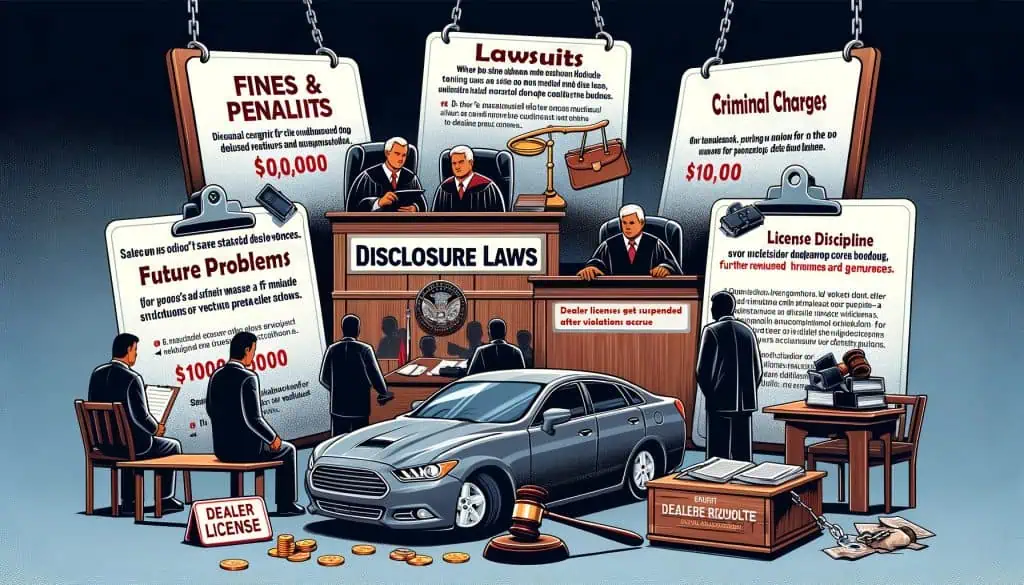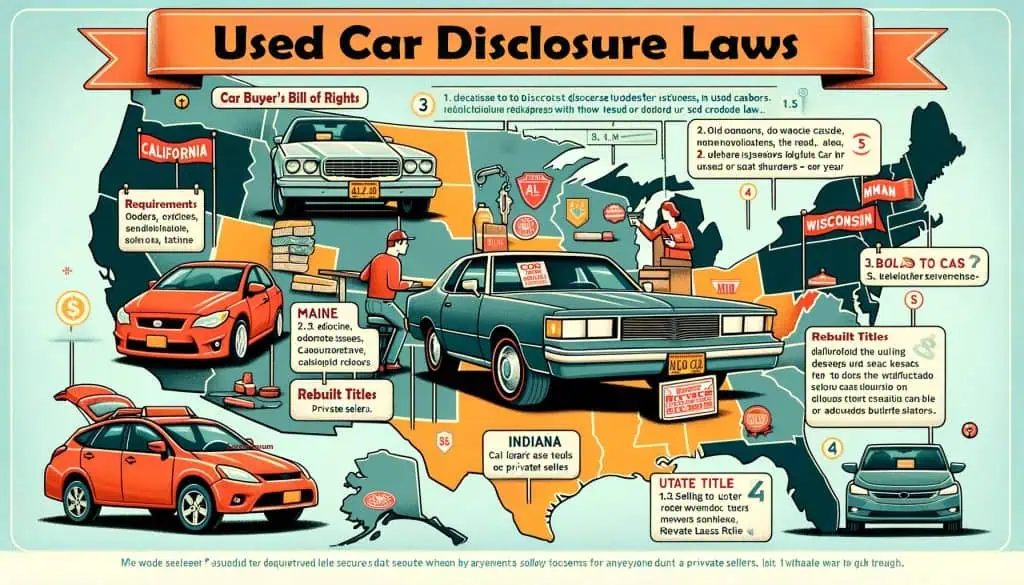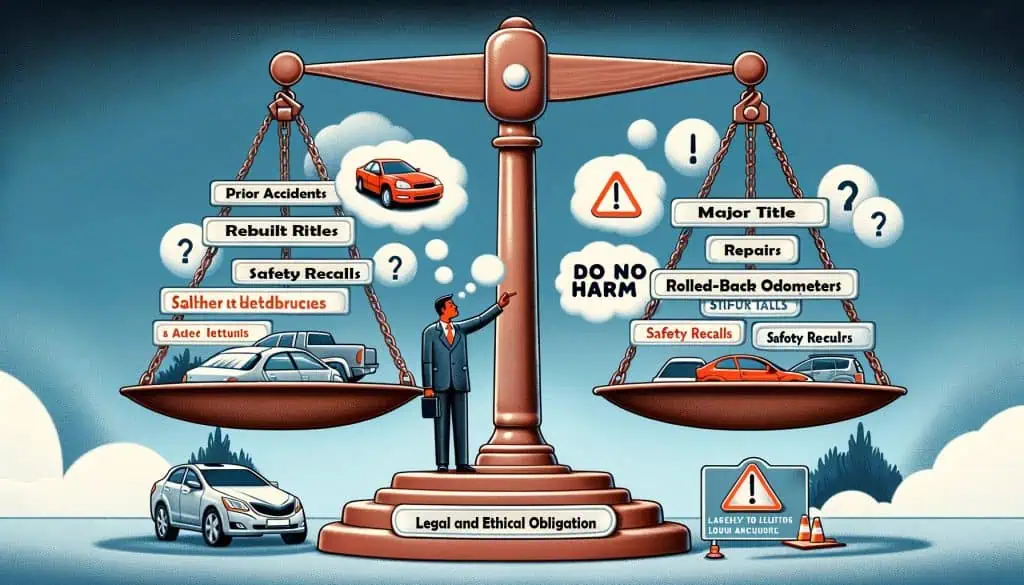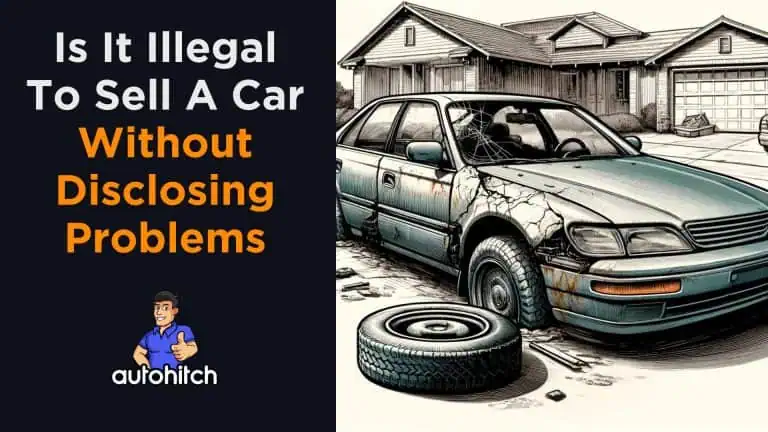While laws vary by state, sellers generally must disclose any significant, safety-related, or material defects they’re aware of that could impact drivability or value. This includes prior accidents, major repairs, rebuilt titles, rolled-back odometers, and safety recalls.
Although prison or jail time isn’t likely in most cases, selling a used car with undisclosed problems can open you up to lawsuits or charges, which I discuss in more detail below.
As a former used car dealer, I highly recommend being upfront about any issues to ensure a fair and legal sale. This protects both the buyer and seller.
Relevant Articles to Read:
- Is It Illegal To Trade in a Car With Problems
- How to Sell a Car Privately
- Can a Dealership Sell a Car With a Salvage Title
- As Is No Warranty- What You Need To Know
- 3 Day Right To Cancel Car Purchase
- Possible Red Flags or Signs of a Scam When Buying a Car
- How To Sell Salvage Title Car
- How to Sell a Total Loss Car
Table of Contents
Disclosing Problems When Selling a Car
Disclosure laws for people selling used cars vary widely across states. Some general guidelines:
Dealers have the most obligations to disclose under Federal Trade Commission (FTC), state consumer protection, and state dealer regulations. Dealers must disclose:
- Prior accidents
- Major repairs
- Rebuilt titles
- Safety recalls
- Rolled back odometers
- Other material defects
Advertising a detailed inspection but not disclosing uncovered issues is illegal false advertising under the FTC’s Used Car Rule.
Private sellers
Private Sellers often have minimal mandated disclosure unless state laws require more. But denying issues when asked directly or intentionally hiding problems still risks lawsuits and charges.
- In California and Virginia, even private sellers must disclose serious issues unprompted. Check your state laws.
“As-is” sales don’t remove liability for failing to disclose material facts or outright denying issues when asked.
An as-is disclosure just confirms no express warranty.
Consequences of Violating Disclosure Laws
Failing to make required disclosures under applicable state laws or denying problems when asked directly about them can enable various civil and criminal consequences, including:

- Lawsuits – Buyers can sue for damages related to undisclosed issues. Expect legal fees, repair costs, loss of vehicle value, loss of use, and other damages sought.
- Fines & Penalties – States levy fines up to $10,000 per violation of deceptive trade practice laws, like fraudulent concealment or false advertising related to disclosures.
- Criminal Charges – Intentionally hiding material facts from a buyer, especially unsafe defects, can warrant criminal fraud or reckless endangerment charges.
- License Discipline – Dealer licenses get suspended or revoked after violations accrue. Certain disclosure issues trigger automatic sanctions.
- Future Problems – Word spreads locally about sellers who hide issues. And Carfax/AutoCheck permanently collect data on vehicle histories that hurt resale value.
Maintaining integrity around full transparency pays dividends for seller reputations and peace of mind by deterring the types of legal messes no one wants to face.
Protect Yourself: Disclose in Writing
To avoid the “he said, she said” disputes that often arise after undisclosed issues surface post-sale, put disclosures in writing. Here are some tips:
- Detail known defects, damage history, repairs, etc. in the sales listing and bill of sale.
- Note safety recalls and whether repaired. NHTSA databases help spot them.
- If selling as-is, boldly state that plus the buyer’s duty to inspect before purchase.
- Review paperwork to ensure proper title transfer and no outstanding liens/loans that haven’t been settled.
- Both buyer and seller should sign the detailed bill of sale after reviewing disclosures.
Taking these documentation steps, especially a signed bill of sale noting disclosures, provides solid legal proof later on if disputes arise over what was shared beforehand.
State-Specific Used Car Disclosure Laws
While used car disclosure legislation has stalled federally, state laws add requirements in places like:

California’s Car Buyer’s Bill of Rights makes private party sellers liable for failure to disclose certain defects, like rolled back odometers, known safety recalls, or if the car was declared a total loss by insurance.
Maine and Wisconsin have their own Used Car Rule disclosure regulations that apply to everyone selling more than 5 used cars per year in the state, including individuals.
Indiana recently passed a law requiring disclosure of rebuilt titles on vehicles being sold by private sellers.
So research the specific disclosure rules in your state since important nuances apply. Statutes like lemon laws typically only cover dealer sales though.
Buying a Car? Protect Yourself Through Inspections
With limited mandatory disclosures from private sellers, buyers should complete their own due diligence before purchase using professional inspections. Key steps:
- Test drive to feel transmission, electronics, steering, and drivability.
- Inspect for leaks, frame damage, paint quality, tire wear and alignment, etc. A mechanic’s expert eye helps most.
- Research history through vehicle history reports from national databases that compile damage, repair, registration, odometer, and recall info.
- Ask direct questions about condition, repairs, upgrades, pertinent dates, warranty coverage, why they’re selling, etc.
- Review title to confirm no outstanding liens or loan obligations on the car before transferring to the new owner.
Undertaking these critical inspections shifts some of the disclosure burden to buyers themselves. But they also empower buyers to gain a true transparent view of vehicle condition from both sides.
Disclosing Issues: Your Legal and Ethical Obligation

While laws vary by state, sellers generally must disclose any significant, safety-related, or material defects they’re aware of that could impact drivability or value. This includes prior accidents, major repairs, rebuilt titles, rolled-back odometers, and safety recalls.
Full disclosure should be standard practice for ethical reasons, too. How would you feel about buying a car where the seller hides expensive problems from you?
So legally and ethically, not disclosing issues violates basic principles of fairness and good faith. It erodes trust in the marketplace that supports all of our livelihoods as sellers.
Plus, undisclosing problems, especially safety defects, threatens well-being and violates “do no harm” ethics. What if that issue later hurts someone?
My Final Thoughts
Selling or buying a used car without comprehensive disclosures remains an unnecessary risk I steer clear of. Laws are moving towards mandated transparency from all sellers – and public expectations support full disclosure too.
As an ex-dealer, I cannot imagine handling sales any other way. It always pays to be upfront and honest so both parties walk away satisfied with a fair deal built on trust. That principle serves sellers like us well in good times and bad.
Resources For This Article:
- https://www.autotrader.com/car-shopping/buying-a-used-car-from-a-private-seller-legalities
- https://www.reddit.com/r/cars/comments/9cpjxq/what_do_you_disclose_when_you_sell_a_car_when_is/?rdt=36809
- https://www.quora.com/Is-it-unethical-to-sell-a-used-car-without-fully-disclosing-problems-you-may-have-experienced
- https://www.lendingtree.com/auto/used-car-laws/
- https://www.reddit.com/r/confession/comments/12va4sl/i_just_sold_my_car_and_didnt_disclose_all_its/?rdt=46308
- https://www.theconsumerlawgroup.com/blog/suing-a-car-dealership-for-undisclosed-frame-damage.cfm
Disclaimer: The information provided in this article does not, and is not intended to, constitute legal advice. Instead, all information is prepared for general informational purposes only. Readers should consult their own legal counsel to determine how the law applies to their specific circumstances.



